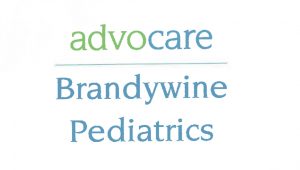Stay up-to-date on the most current news at Brandywine Pediatrics. We will post office closings, vaccine availability, and more as news is available.
Exciting Name Change!
No, we are NOT being bought!
Brandywine Pediatrics is proud to announce that we will be joining one of the region’s leading physician-owned medical organizations called Advocare! Advocare originated 26 years ago and has grown in size to include elite groups within New Jersey, Pennsylvania, and now Delaware. Our name will change to
Advocare Brandywine Pediatrics 
but our physicians, staff, location and day-to-day operations will remain unchanged. Medicine is an ever-changing landscape and our goal in joining Advocare is to stay on the forefront of medical technology while continuing to provide the personalized care we have for decades. Because of our name change, your insurance will have to be updated with our new information which you can find below. We recognize that change can be stressful and we appreciate your patience as we proceed through this transition.
Office Closure: Sunday, November 3
The office will be closed on Sunday, November 3, 2024, due to water main work.
We will be open Saturday for morning hours, as usual, and reopen Monday, November 4.
Thank you.
Dr. Jara to join Brandywine Pediatrics in 2025
We are excited to announce that Dr. Jorge Jara Kudin is joining Brandywine Pediatrics in early 2025. Dr. Jara will assume Dr. Simonetti’s and Dr. Irwin’s practice following their retirement at the end of 2024.

Dr. Jara is a graduate of the University of Virginia School of Medicine, a Board-Certified pediatrician, and a Fellow of the American Academy of Pediatrics. He grew up in Latin America – living in Colombia, Mexico, and Bolivia – before coming to the United States for college. He graduated with honors from the University of Pennsylvania, receiving a dual major in Economics and Political Science. After graduating, he worked in management consulting for several years in New York City, prior to switching careers to pursue his true vocation of practicing medicine.
He completed the post-baccalaureate pre-medical program at Columbia University and subsequently received his medical degree from the University of Virginia. After graduating from medical school, he completed his pediatrics residency training at Nemours Children’s Health (formerly A.I. DuPont Hospital for Children). Dr. Jara then joined Nemours Children’s Health as a primary care pediatrician, where he has worked for 7 1/2 years.
Shortly after residency, Dr. Jara met his beautiful wife, Christina. They settled in Wilmington and are raising a wonderful son – with another on the way! Most of all, Dr. Jara enjoys spending time with his family. His neighbors often see him and his son playing by the creek and collecting bugs, sticks, and rocks. Dr. Jara and his wife love to travel and are hoping to one day venture out to explore Japan.
New Faces
A late welcome to our new Nurse Practitioners and Physician Assistant. For those who have not yet met them, we introduce Lauren Edgar, Pediatric Nurse Practitioner; Anna Reynolds, Pediatric Nurse Practitioner; and Rebecca Simonetti, Pediatric Physician Assistant, all of whom are seeing patients. Rebecca (yes, she is related to Dr. Simonetti! – her niece) primarily spends her time in Dr. Walter’s area, being his “other half,” now that he is half-time. Don’t worry. We still have our amazing Tina. And if you are lucky, you might still see Kay, whom we are never going to let retire completely! We are all very happy to have had this great group of practitioners join Brandywine Pediatrics.
New Covid Isolation 2024
New Respiratory Virus Guidance recommends staying home and away from others until at least 24 hours after both symptoms are getting better overall and fever has been gone (without using fever-reducing medication). This period could be shorter, the same, or longer than the previous guidance for COVID-19. Guidance is now similar to what it has always been for viral respiratory infections, like the flu.
The guidance still encourages added precaution over the next five days after time at home, away from others, is over. Since some people remain contagious beyond the “stay-at-home” period, continuing added precautions, such as taking more steps for cleaner air, enhancing hygiene practices, wearing a well-fitting mask, keeping a distance from others, and/or getting tested for respiratory viruses can lower the chance of spreading respiratory viruses to others.
Prevent Respiratory Virus Spread
Covid Vaccine Available
Covid vaccine for 6 months and up (Moderna) is available at well visits or at designated shot visits. Please call your doctor’s office to schedule.
.
Newborn Nursery Rounds
As of October 2, Brandywine Pediatrics doctors will no longer be rounding on newborns born at Christiana Hospital. This has been a difficult and sad decision for us, as we have always loved seeing babies and their parents right after birth. But, it is time for us to change. Newborn babies will still be seen within 24 hours of birth, by one of the hospital pediatricians, with whom we have been in close contact. And we still eagerly await seeing families at their first visits within days of discharge.
Please call us with questions or concerns, before or after delivery.
We look forward to seeing you!
Scheduling your first newborn visit.
Your baby should generally be seen within 48 hours after discharge from the nursery.
Please call your doctor’s telephone number to schedule.
Please be sure to have your ID and insurance cards present at check-in.
Whose insurance policy? A newborn is automatically covered under the parent’s policy for the first 30 days, after which the child(ren) needs to be added to a parents policy. If each parent has his or hoer own policy, the parent whose birthday (month and day only) falls first in a calendar year is the parent with the primary coverage for the dependent.
Insurance or billing questions?
Call (302) 478-2613 Monday-Friday 7:30 am – 3:30 pm
Welcome to Dr. Rachel Chang
Dr. Chang joined us in mid-December, taking over the practice from Dr. Gould. Originally from the Philly area, she is moving back from Chicago, from Northwestern University & Lurie Children’s Hospital of Chicago. Along with a stellar resume, she brings several years of primary pediatric experience and an enthusiasm which we feel will be a perfect fit for Brandywine Pediatrics. Please join us in welcoming Dr. Chang to our area.

We will miss you, Dr. Gould.
Dr. John Gould started his well-deserved retirement in December of this year. He practiced at Brandywine Pediatrics for over 20 years and will be sorely missed by his colleagues and patients. Although we are sad to lose him, we are excited for him to move on to new his new life adventures, including being a grandfather.
Feel free to post messages on our Facebook page or, of course, to wish him well directly.
We are thrilled to have Dr. Rachel Chang taking over his practice.

RSV Protection! Flu & COVID vaccine info
We have the new Beyfortus RSV immunization for healthy infants under 6 months of age heading into their first winter! Unfortunately it is already in short supply nationally but we still have doses available.
It is available at well visits and “shot only” appointments, as the supply lasts. And PLEASE check with your insurance first to see whether it is covered as a routine immunization or whether will only be applied to your deductible.
Flu shots are available now. No shortage so far.
We have Covid vaccine for 6 month olds and up, which may be given at well visits or shot-only visits. Please call the office to schedule.
To locate other Covid vaccination sites, see:
Flu, Covid & RSV Shots available now
Call your doctor/triage for appointments.
These vaccines can also be given during routine wellness visits.
The Breast Advice
from Angela Leonard, IBCLC.
Call (302) 478-2604 or your doctor’s number to schedule a lactation appointment.
Congratulations on your new baby. Whether this baby is your first, second, third, or more, we understand that bringing home a newborn can be exhausting and a little scary. We hope that this note serves as a soothing reminder that we are here for you whenever you need us and the information you need is here at your fingertips. Remember, the goals of the early days of breastfeeding are to establish your supply and teach baby how to feed well at tfrom the breast. Keeping baby and mommy comfortable and together and allowing your baby frequent opportunities to nurse will help get you off to a good start!
Here’s what we want you to know about nursing you new baby:
Newborns are wired to suck. Keeping baby skin to skin with mommy in the early days helps meet that innate need. Newborn babies need to nurse frequently – 8-12 times in 24 hours.
There rare only two rules to successful breastfeeding.
[1] You MUST FEED YOUR BABY.Frequent effective breastfeeding (whenever possible) is the best choice! Babies should take both breasts at each feeding in these early days. If baby baby falls asleep after 15-20 minutes on the first side, change the diaper to wake baby up, and offer the other side!
Supplementation is necessary, if baby will NOT latch on the breast after the first 12 hours of life. If this is the case, you should see a lactation consultant as soon as possible. We also encourage supplements, if baby is not meeting minimums for wet/soiled diapers each day.
[2] PROTECT your MILK SUPPLY.If baby is not latching and nursing well, you must PUMP your breasts frequently to encourage your milk to come in. Pumping tells your body that it needs to produce milk.
Around days 3-5 it is normal for baby to want to nurse very frequently. It’s important to let baby do just that. This is the was your baby tells your bady to make more milk. Offering unnecessary supplementation during this time can hinder milk production. If you are concerns, CALL us!
Latch is so important. Sometimes it just takes a few minutes of hands-on help to make breastfeeding much more comfortable for mommy and more productive for baby. A baby with a shallow latch will not get as much milk as a baby who latches well, and OUCH! for mommy.
Why call me?
I am an Internationally Board-Certified Lactation Consultant. That means that I specialize in breastfeeding and infant feeding issues. I am in the office Monday, Tuesday, Wednesday, Thursday and some Fridays. You may call any time and leave a message but please remember, if I am not her, the machine is not checked. Your doctor’s triage specialist can help answer your questions and you are always encouraged to call with concerns.
I want you to come see me, if you are having difficulty with latch, have sore nipples, if baby is not gaining appropriately, or if baby is not wetting or stooling frequently enough. I want to see you, if you have had breast surgery in the past or if you feel like your milk is not coming in as it should. I am here to help you throughout your nursing relationship with your baby and can help you sort out pumping and returning to work, as well as some nursing challenges that may arise as baby grows.
Schedule Summer/Sports Physicals
Call Michelle @ 302-478-2604 to schedule your child’s physical.
Additional appointments have been added.
Change in Mask Policy
Today, May 11, the Public Health Declaration of COVID-19 ends. A mask-optional policy for (well) patients and healthcare workers is now in place. We continue to request that sick patients, particularly those with fever or cough or suspected Covid continue to mask. All others may wear masks or not as they feel comfortable. Medical staff members will attempt to comply with patient preference.
We realize that we have families that feel strongly on both sides of this decision and aim to respect each individual decision. Please respect the decisions of all other patients/families and staff. Thank you for your continued support.
Here now… PCR tests in house at Brandywine Pediatrics
We finally have our PCR machine here and running. We can test for Covid, RSV, flu, and Strep. Results in as little as 30 minutes.
(Please note, most – but not all – insurances are covering this testing. Please check with your insurance provider. You could be billed an additional charge for testing.)
Formula Shortages
See AAP guidance on how to manage if your formula supply is getting low. Hopefully, this will be a very short-lived problem.
What if baby formula is out of stock everywhere?
The U.S. Food & Drug Administration announced it is taking steps to help improve supply of infant and specialty formula products. However, if you’re struggling to find baby formula during the shortage, here are some tips that can help.
Keep in mind, this advice is strictly for URGENT situations. If you have any concerns about your baby’s nutrition, please talk with your pediatrician.
Check smaller stores and drug stores, which may not be out of supply when the bigger stores are.
If you can afford it, buy formula online until store shortages ease. Purchase from well-recognized distributors and pharmacies rather than individually sold or auction sites.
For most babies, it is OK to switch to any available formula, including store brands, unless your baby is on a specific extensively hydrolyzed or amino acid-based formula such as Elecare (no store brand exists). Ask your pediatrician about recommended specialty formula alternatives available for your baby.
Check social media groups. There are groups dedicated to infant feeding and formula, and members may have ideas for where to find formula. Make sure to check any advice with your pediatrician.
Is it OK to put more water in baby formula?
No. While it may be tempting to water down formula to stretch it out, it is not safe to do that. Always follow label instructions or those given to you by your pediatrician. Watering down formula is dangerous. It can cause nutritional imbalances in your baby and lead to serious health problems. Always mix formula as directed by the manufacturer.
Can I make my own baby formula?
The AAP strongly advises against homemade formula. Although recipes for homemade formulas circulating on the internet may seem healthy or less expensive, they are not safe and do not meet your baby’s nutritional needs. Infant deaths have been reported from use of some homemade formulas.
What should I know about imported baby formula?
The FDA is considering accelerated approval of certain imported formulas. Many sold in Europe, for example, contain adequate nutrients but must be imported in a way that maintains temperature and other safety issues. That’s why FDA oversight is critical.
Can toddler formula substitute for regular formula?
Toddler formulas are not recommended for infants. However, if you absolutely have no other choice, toddler formula is safe for a few days for babies who are close to a year of age.
Can I give my full-term baby premature formula?
Formulas designed for babies who were born premature (and have “catch-up” growth to do) can safely be used for a few weeks to feed full-term babies if nothing else is available.
Is cow’s milk a safe alternative to baby formula?
If your child is older than 6 months of age and is usually on regular formula (not a specialty product for allergies or other special health needs), this may be an option. In a pinch, you could feed them whole cow’s milk for a brief period of time until the shortage is better. This is not ideal and should not become routine. However, it is a better option than diluting formula or making homemade formula. Although we don’t have a specific amount of cow milk that infants 6-12 months should drink in this situation, follow the limits of no more than 24 ounces a day for children over a year of age. See “Recommended Drinks for Children Age 5 and Younger.”
The most important concern with giving an infant over 6 months of age cow’s milk if you can’t find baby formula is making sure they get enough iron to prevent anemia. Be sure to include plenty of iron-containing solid foods in their diet while you are using whole cow’s milk. You may also talk with your pediatrician about giving your baby an iron supplement until you can find formula again.
What about feeding my baby goat’s milk?
Goat’s milk is not approved for babies in the United States. However, there are goat milk-based baby formulas registered in other countries that may be among those considered for accelerated import approval by the FDA.
Can I use plant-based milk instead of baby formula if needed?
Milk alternatives are not recommended for babies under a year of age or infants with certain medical conditions requiring specialized formulas. Soy milk may be an option to give babies who are close to a year of age for a few days in an emergency, but always buy the kind that is fortified with protein and calcium. Make sure to change back to formula as soon as some is available. Be especially careful to avoid almond milk or other plant milks as these are often low in protein and minerals.
What is the shelf life of baby formula?
Check the “use by” date on infant formula, which is required by FDA regulations to be on each container. Until that declared date, the formula will contain no less than the amount of each nutrient on the product label and will otherwise be of acceptable quality.
Remember:
Don’t hesitate to talk with your pediatrician if you have any concerns you have about your baby’s health and nutrition. If your child has special health needs, be sure to check with their doctor about medically appropriate and safe feeding alternatives.
Remember also that older babies (~6+ months) w/o allergies can have yogurt, etc, to help boost calcium intake and can drink water for fluids. A multi-vitamin w/ iron may help cover nutritional gaps, if typical formula intake is restricted for those babies.
Some COVID-19 Vaccine Answers
Children rarely get ill from COVID-19. Why should they be vaccinated?
- To avoid getting Covid: Having Covid, isolations time, quarantine time all interfere with education and social time for children and work time for parents.
- To avoid getting MIS-C (Multisystem Inflammatory Syndrome in Children): While most children do not get sick enough with Covid to be hospitalized, MIS-C is a severe complication that occurs in about 1 in 1000 children who have had Covid, even mild illness.
- To avoid “long haul” Covid: More research is being done into why and in whom “long haul” Covid appears. “Long haulers” have continuing symptoms long after the original infection has cleared.
- To avoid transmission: Children who get mild illness could pass the infection along to peers or adults at higher risk.
- To help protect everyone’s freedom to stay healthy and enjoy a “normal” life: The vaccine is not perfect protection against infection. But, the more people in any group (family, classroom, town, state, etc.) who are vaccinated, the better the group’s protection.
But what about Myocarditis?
- It is still better to get the vaccine.
- COVID-19 illness can cause severe myocarditis. Myocarditis is inflammation of the heart muscle, makes the heart work harder to pump blood, and can cause permanent scarring & weakening of the heart. It can happen from any virus to any person, but it is 37 times more likely in children with Covid and 7 times more likely in older teens and young adults with Covid.
- Patients are still much less likely to get myocarditis from the vaccine than from Covid itself. The rate of vaccine-associated myocarditis is about only 0.0004%. The myocarditis cases after Covid vaccine, mostly in young men and male adolescents, has been very mild and treatable. All patients studied have had a normal heart afterwards.
Which vaccine has been approved?
- Pfizer-BioNTech’s COVID-19 mRNA vaccine has emergency use authorization for children ages 5 to 15 years old. The vaccine has been named Comirnaty. Children 5-11 years old will receive a dose 2/3 that of 12 and over.
(100% effective in preventing COVID-19 in children ages 12 through 15. The vaccine is 91% effective in preventing severe illness with COVID-19 in people age 16 and older. Early research also suggests that the vaccine is 96% effective at preventing severe disease with COVID-19 caused by the delta variant.)
- Will it help against omicron variant? So far, we just don’t know. But as of now, omicron variant is only just being detected in this country.
COVIDVaccineAnswers.org by Children’s Hospital of Philadelphia
The Science Behind COVID-19 Vaccines by Healthy Children, American Academy of Pediatrics
Dr. Paul Offit of CHOP, infectious disease and vaccine expert, discusses COVID-19 illness and vaccination for teens and young adults. Video
COVID-19 and Myocarditis (excerpted from the American Academy of Pediatrics):
Across all ages, the risk of myocarditis was almost 16 times higher for people with COVID-19 compared to those who aren’t infected. The myocarditis risk is 37 times higher for infected children under 16 years and seven times higher for infected people ages 16-39 compared to their uninfected peers. Males ages 12-29 years — the group with the highest rates of myocarditis after vaccination — 39 to 47 cases of myocarditis for every million second doses of vaccine. [Ed. ~0.004%] Benefits of vaccination outweigh the risks.
Read the full article: COVID-19 Vaccination & Myocarditis Risk in Children
Telemedicine Available
In response to the COVID-19 pandemic, Brandywine Pediatrics’ providers offered Telemedicine to our patients in Delaware. Few physicians have continued this, but if you feel it is necessary to have a telemedicine visit, please discuss with physician or triage specialist.

